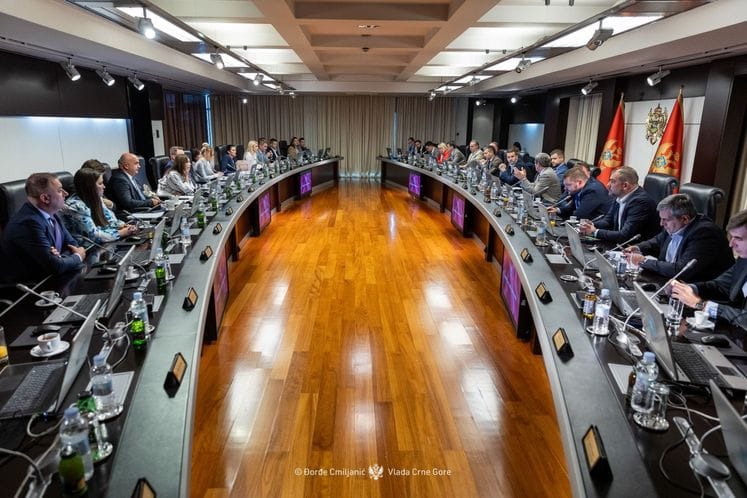- Government of Montenegro
Press release from the 51st Cabinet session
Press release from the 51st Cabinet session

At its 51st session held today, chaired by Prime Minister Milojko Spajić, the Montenegrin Cabinet adopted the Draft Law on Amendments to the Law on Patents. The purpose of the amendments is to enable the competent authority to conclude cooperation agreements with national or international patent offices for the provision of information services, including agreements for the preparation of search reports and written opinions. Additionally, it allows the applicant, who intends to obtain a search report with a written opinion on whether their invention meets the conditions prescribed by law, to submit a translation of the patent application in English and bear the costs of the procedure. The patent holder is also given the option to request the competent authority to obtain a patentability examination result from one of the international patent offices, provided they have not filed a patent application for the same invention with any office specified by the current law. Previously, patent holders could only obtain patentability examination results from a national patent office with which the competent authority had signed a cooperation agreement. It was also established that applicants for patent revocation must bear the costs incurred by the competent authority and the state patent office with which a cooperation agreement has been concluded for the revocation process. The proposed amendments align the current law with the Agreement on the Application of Article 65 of the Convention on the Grant of European Patents, particularly regarding the language requirements for submitting patent documents to the competent authority.
The Cabinet adopted the Report on the implementation of the programme for combating the informal economy in Montenegro 2024–2026 (for the first six months of 2024). The Programme aims to reduce the share of the informal economy in GDP, focusing on reducing informality among registered businesses and entrepreneurs, primarily tax evasion and underreporting of income. It also partially addresses illegal activities that reduce budget revenues and limit economic growth. The general goal is to decrease the overall share of the informal economy, which will be achieved through five operational goals, including: stimulative and preventive measures to simplify procedures and reduce business costs; raising public awareness of the negative impacts of the informal economy and strengthening the role of education; repressive actions and deterrence through increased oversight and sanctions.
The Report provides a detailed overview of planned activities across all operational goals, with a status update on implementation.
The Cabinet adopted the Report on the implementation of the programme for the construction, maintenance, reconstruction, and modernization of railway infrastructure for 2023. The annual programme covers maintenance work by type, scope, and financial allocations, costs for managing and regulating traffic, and planned modernization, reconstruction, and construction activities. The Report notes that in 2023, the Railway Infrastructure of Montenegro (ŽICG) received €14,994,064 from the Budget, of which €9,998,091 was allocated for current maintenance, and €4,995,973 for settling obligations from international loans. Due to liquidity issues, railway companies owed ŽICG €3,118,005 at the end of 2023, with obligations towards suppliers totaling €1,329,888 and tax and salary contributions amounting to €4,320,624. It is evident that ŽICG cannot finance any investment or repay international loans from its operational funds, requiring a significant increase in annual budget allocations.
The Cabinet adopted a decision regarding student loan and scholarship amounts for top students. According to the decision, the minimum student loan will be €150, the average loan €171, and the maximum loan €215, while the top students' scholarships will be set at €300. This decision is aimed at supporting students in achieving their educational goals, considering available financial resources and legal frameworks. The Ministry of Education, Science, and Innovation grants student loans and scholarships to students attending higher education institutions in Montenegro or Montenegrin citizens studying abroad, provided they have enrolled in the appropriate semester.
The Cabinet adopted information regarding the project "Nikšić 2030: European Capital of Culture." The European Capital of Culture is an initiative of the European Union launched in 1985, representing one of the most ambitious cultural projects in Europe. The title is held for a year, with at least two cities from EU member states chosen each year. Montenegro, as a country in pre-accession negotiations, is eligible to apply. The municipality of Nikšić has prepared its candidacy based on the concept of the "Open City," which is rooted in the city's local narrative and inspired by the vision of the Trogir architect Josip Slade Šilović, who designed the first urban plan of Nikšić in 1883. This concept presents Nikšić as a meeting place of different cultures and styles and is aligned with the principles of the New European Bauhaus: the Open City is beautiful, inclusive, and sustainable, where everyone is equal and has the opportunity for creative development.

